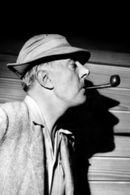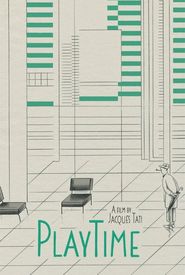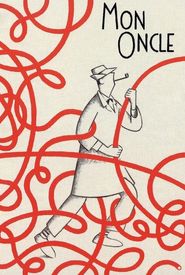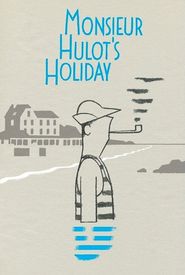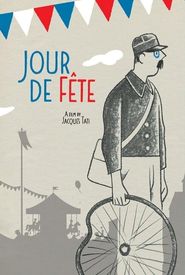Here is Jacques Tati's biography:
Jacques Tati was born Taticheff, descended from an noble Russian family. His grandfather, Count Dimitri, had been a general in the Imperial Army and had served as military attaché to the Russian Embassy in Paris. His father, Emmanuel Taticheff, was a well-to-do picture framer who conducted his business in the fashionable Rue de Castellane and had taken a Dutch-Italian woman, Marcelle Claire van Hoof, as his wife.
After graduating, Jacques Tati's main preoccupation became sports. He already boxed and played tennis and was introduced to rugby during a sojourn in London. Back in Paris, he joined the Racing Club de France (1925-30),and for some time seriously contemplated a career as a professional rugby player. However, Jacques also had an uncanny talent for pantomime, imitating athletes at his school to the amusement of classmates and teachers.
By the time he had reached the age of 24, encouraged by his success as an entertainer in the annual revue of the Racing Club, he suddenly decided to combine his two passions and, without further ado, entered the world of show business. From 1931, Jacques toured the Parisian music halls, theatres and circuses with his impersonations, acrobatics, drunk waiter and comic tennis routines.
Jacques Tati made his screen debut in a series of short featurettes, tailored to show off his practised gags, notably Oscar, champion de tennis (1932) and Watch Your Left (1936). The Second World War, military service and inherent strictures resulting from the German occupation put a temporary halt to his career.
The small township of Sainte-Sévère, where Tati had taken refuge during the occupation, served as inspiration for his first film, initially conceived as a one-reeler entitled "L'Ecole des facteurs" (School for Postmen). Unable to find widespread distribution, Tati decided to re-shoot the bucolic comedy -- with himself in the central role -- as a feature film, using the villagers as extras and filming everything on location. And thus, The Big Day (1949) and Francois the village postman came into being.
With "Holiday", Tati reinvented the visual comedy of the silent era in a style not dissimilar to that of Max Linder. There is hardly any dialogue, except for background chatter, but natural and human noises are enhanced whenever required for the desired comic effect. The film is almost plotless, essentially comprised of a series of vignettes at a seaside resort frequented by assorted holiday makers.
Tati's subsequent ventures, Hulot became relegated from being the focus of the story to merely subordinate to its concept. As just one of many characters, Hulot weaves in and out of My Uncle (1958) and Playtime (1967),his simple, old-fashioned world contrasted sharply against the coldness of mechanisation, obsessive consumerism and the growing uniformity of houses and cities.
Tati's next project, Traffic (1971),a satire of modern man's love of cars, failed to recoup the losses of Playtime. Creditors impounded Tati's films, which were not re-released until 1977, when a canny Parisian distributor expunged his outstanding debts. Throughout his career, Tati remained obdurately committed to his artistic integrity and to his independence as a filmmaker.
